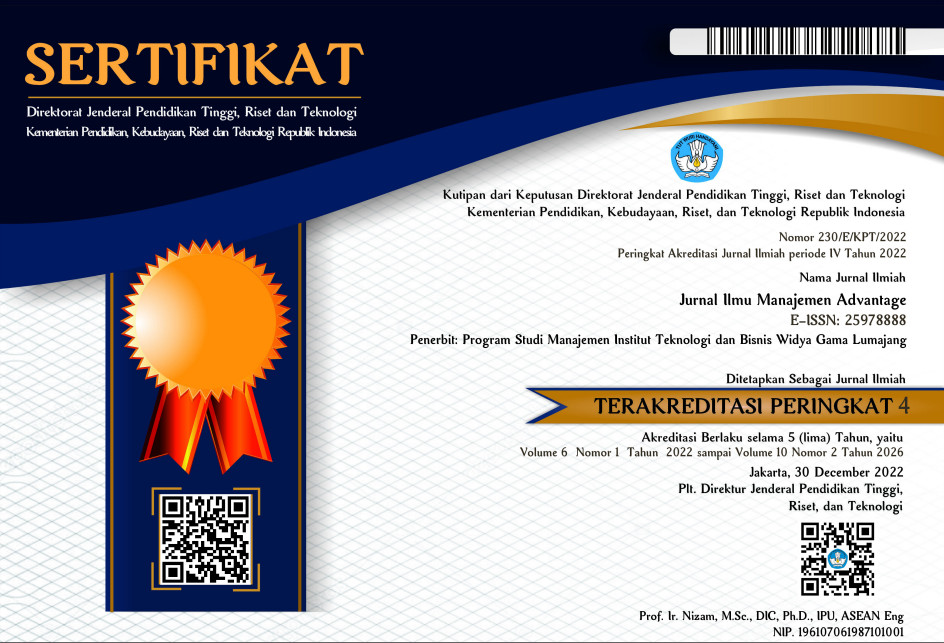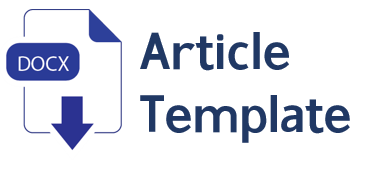Factors Affecting Financial Behavior of Micro, Small and Medium Enterprises (MSMEs): The Role of Financial Inclusion, Financial Literacy and Financial Technology
DOI:
https://doi.org/10.30741/adv.v8i2.1333Keywords:
Financial Behavior, Financial Inclusion, Financial Literacy, Financial TechnologyAbstract
The research examines the factors that influence the financial behaviour of micro, small and medium-sized enterprises (MSMEs), focusing on the roles of financial inclusion, financial literacy, and financial technology, framed within the Theory of Planned Behavior. The population for this research consisted of 89,553 MSME players, with a sampling technique utilizing the Slovin formula to achieve a sample size of 142 respondents. Using a mixed-methods approach, the research combines quantitative surveys of MSME owners. The findings reveal that financial inclusion significantly enhances access to credit and financial services, thereby improving the financial behavior of MSMEs. Additionally, higher levels of financial literacy correlate with better financial management practices, leading to increased profitability and sustainability. The study also highlights the transformative impact of financial technology, which facilitates easier access to financial resources and enhances operational efficiency. The results indicate that financial inclusion, financial literacy, and financial technology have a positive and significant effect on the financial behavior of MSMEs. This suggests that targeted interventions in these areas could foster greater economic resilience and growth within this vital sector.
Downloads
References
Aeni, N. N., & Innayah, M. N. (2022). Factors Affecting Financial Literacy of MSMEs: A Conceptual Framework. Proceedings Series on Social Sciences & Humanities, 7, 9–15. https://doi.org/10.30595/pssh.v7i.466
Ajzen. (2005). Theory of Planned Behaviour. 14(1), 55–64.
Ajzen, I. (1991). Attitudes, personality and behaviour. McGraw-hill education (UK).
Alfalisyado, Yudhistira Pradhipta Aryoko, Firdaus, M. F. (2023). Penguatan Bisnis Melalui Pelatihan Pengelolaan Keuangan Berbasis Digital Bagi Pelaku UMKM Di Kecamatan Wangon. JCSE: Journal …, 4(2), 148–155. https://jurnal.universitasputrabangsa.ac.id/index.php/jcse/article/view/453%0Ahttps://jurnal.universitasputrabangsa.ac.id/index.php/jcse/article/download/453/275
Aminullah, R. A., Sariyanti, S., & Qadar, H. L. (2020). The Role of Micro, Small, and Medium Enterprises (Msmes) in Absorbing Manpower in Ciamis District. Syari’ah Economics, 4(2), 73–84.
Andriyani, P., & Sulistyowati, A. (2021). Analisis pengaruh literasi keuangan, inklusi keuangan, dan tingkat pendidikan terhadap perilaku keuangan pelaku UMKM kedai/warung makanan di Desa Bahagia Kabupaten Bekasi. Aliansi: Jurnal Manajemen Dan Bisnis, 16(2), 61–70.
Anisyah, E. N., Pinem, D., & Hidayati, S. (2021). Pengaruh literasi keuangan, inklusi keuangan dan financial technology terhadap perilaku keuangan pelaku UMKM di Kecamatan Sekupang. MBR (Management and Business Review), 5(2), 310–324.
Ansir, V. R., Pongoliu, Y. I. D., & Hamin, D. I. (2022). Analisis Tingkat Literasi Keuangan pada Pemilik UMKM di Kabupaten Gorontalo Utara Provinsi Gorontalo Tahun 2021. SEIKO: Journal of Management & Business, 5(2), 163–169.
Arini Hidayah, Fatmah Bagis, Mastur Mujib Ikhsani, Akhmad Darmawan, & Bima Cinintya Pratama, Maulida Nurul Innayah, A. P. (2021). 2992-9119-1-Pb. 03(02), 276–281.
Ariska, S. N., Jusman, J., & Asriany, A. (2023). Pengaruh literasi keuangan, financial tekhnologi dan gaya hidup hedonisme terhadap perilaku keuangan mahasiswa. Owner: Riset Dan Jurnal Akuntansi, 7(3), 2662–2673.
Bima Cinintya Pratama, Maulida Nurul Innayah, A. D. (2021). PENDAMPINGAN UMKM DAN PEDAGANG KAKI LIMA (PKL) TERDAMPAK PANDEMI COVID-19 DI AREA KAMPUS UNIVERSITAS MUHAMMADIYAH PURWOKERTO DALAM MENJALANKAN CONTACTLESS BUSINESS. Jurnal Budimas, 21(1), 1–9. https://doi.org/10.1016/j.solener.2019.02.027%0Ahttps://www.golder.com/insights/block-caving-a-viable-alternative/%0A???
BPS Indonesia. (2024). Pertumbuhan Ekonomi Indonesia Triwulan III-2022. Www.Bps.Go.Id, 13, 12.
Çera, G., Ajaz Khan, K., Mlouk, A., & Brabenec, T. (2021). Improving financial capability: the mediating role of financial behaviour. Economic Research-Ekonomska Istraživanja, 34(1), 1265–1282.
Damayanti, L. E., Susilaningsih, & Indriayu, M. (2019). Pentingnya Penanaman Nilai-Nilai Karakter Melalui Perilaku Pengelolaan Keuangan pada Siswa SMA dan SMK di Surakarta. Surya Edunomics, 3(1), 35–48.
Dayanti, F. K., Susyanti, J., & Abs, M. K. (2020). Pengaruh Literasi Keuangan, Pengetahuan Keuangan Dan Sikap Keuangan Terhadap Perilaku Manajemen Keuangan Pada Pelaku Usaha UMKM Fashion Di Kabupaten Malang. E-JRM: Elektronik Jurnal Riset Manajemen, 9(13).
Dinas Koperasi, usaha K. & M. P. J. T. (2024). Dinas Koperasi , Usaha Kecil Dan Menengah Provinsi Jawa Tengah. Dinkop-Umkm.Jatengprov.Go.Id, 19660517. https://dinkop-umkm.jatengprov.go.id/statistik/detail/1
Diskopdaperin. (2024). Data UMKM.
Erlangga, M. Y., & Krisnawati, A. (2020). Pengaruh Fintech Payment Terhadap Perilaku Manajemen Keuangan Mahasiswa. Jurnal Riset Manajemen Dan Bisnis, 15(1), 53. https://doi.org/10.21460/jrmb.2020.151.348
Fadilah, I., Rahman, S., & Anwar, M. (2022). Analisis pengaruh Literasi Keuangan, Inklusi Keuangan, dan Financial Technology terhadap kinerja Usaha Mikro Kecil Menengah (UMKM) di Kota Bandung. Fair Value: Jurnal Ilmiah Akuntansi Dan Keuangan, 5(3), 1347–1354.
Ghozali, I. (2020). Aplikasi Analisis Multivariate dengan Program IBM SPSS 21. Badan Penerbit Undip.
Ghozali, I., & Latan. (2015). Konsep, Teknik, Aplikasi Menggunakan Smart PLS 3.0 untuk Penelitian Empiris. BP Undip.
Gunawan, A. (2023). Financial literacy and use of financial technology payment for consumptive behavior. International Journal of Business Economics (IJBE), 4(2), 92–100.
Hair, J. F., Hult, G. T. M., Ringle, C. M., Sarstedt, M., Danks, N. P., & Ray, S. (2021). An Introduction to Structural Equation Modeling. https://doi.org/10.1007/978-3-030-80519-7_1
Hanifah, G., & Nurul, M. (2024). Improving MSMEs Performance through Human Capital , Financial Literacy and Competitive Advantage. 24(7), 608–624.
Haq, I. I., Tubastuvi, N., Purwidianti, W., & Widhidanono, H. (2023). Pengaruh Literasi Keuangan, Teman Sebaya, Electronic Money, Gaya Hidup, dan Kontrol Diri Terhadap Perilaku Konsumtif Mahasiswa. Jurnal Manajemen Dan Bisnis Indonesia, 9(1), 73–89. https://doi.org/10.32528/jmbi.v9i1.349
Herdinata, C., & Pranatasari, F. D. (2020). Kajian dan solusi manajemen berbasis riset bagi usaha mikro kecil dan menengah. Deepublish.
Islami, A. W., Rahmawati, I. Y., Tubastuvi, N., & Haryanto, T. (2024). Peran Locus of Control Sebagai Variabel Intervening dalam Pengaruh Pengetahuan Keuangan dan Sikap Keuangan terhadap Perilakui Pengelolaan Keuangan pada UMKM. J-MAS (Jurnal Manajemen Dan Sains), 9(1), 323. https://doi.org/10.33087/jmas.v9i1.1612
Jennifer, J., & Widoatmodjo, S. (2023). The Influence of Financial Knowledge, Financial Literacy, and Financial Technology on Financial Management Behavior Among Young Adults. International Journal of Application on Economics and Business, 1(1), 344–353.
Le, T.-H., Chuc, A. T., & Taghizadeh-Hesary, F. (2019). Financial inclusion and its impact on financial efficiency and sustainability: Empirical evidence from Asia. Borsa Istanbul Review, 19(4), 310–322.
Maulidiyan, A. P. (2023). PENGARUH LITERASI KEUANGAN, FINANCIAL TECHNOLOGY DAN INKLUSI KEUANGAN TERHADAP KEBERLANGSUNGAN UMKM. 5, 1–14. https://www.ncbi.nlm.nih.gov/books/NBK558907/
Milana, C., & Ashta, A. (2020). Microfinance and financial inclusion: Challenges and opportunities. Strategic Change, 29(3), 257–266.
Mujiatun, S., Jasin, H., Fahmi, M., & Jufrizen, J. (2022). Model Financial Technology (Fintech) Syariah di Sumatera Utara. Owner: Riset Dan Jurnal Akuntansi, 6(3), 2830–2839.
Munawar, A. H., Subrata, A., & Nugraha, C. (2023). Kontribusi financial technology (fintech) payment terhadap perilaku manajemen keuangan pada masa pandemi covid-19 di Kota Banjar. Inovasi : Jurnal Ekonomi, Keuangan, Dan Manajemen, 19(3), 798–807.
Noor, M., Fourqoniah, F., & Aransyah, M. F. (2020). Investigation of financial inclusions, financial literation, and financial technology in Indonesia. Jurnal Perspektif Pembiayaan Dan Pembangunan Daerah, 8(3), 257–268. https://doi.org/10.22437/ppd.v8i3.9942
Novianti, R., & Retnasih, N. R. (2023). Financial Literacy, Financial Technology (FinTech), and Locus of Control on Financial Management Behavior. Ekonomis: Journal of Economics and Business, 7(1), 422–428.
Panjaitan, F. Y. S. (2022). Analisis Pengaruh Literasi Keuangan, Financial Technology, Dan Pendapatan Terhadap Perilaku Keuangan (Studi Kasus Dosen Fakultas Ekonomi dan Bisnis Universitas Nasional Jakarta). Universitas Nasional.
Parmitasari, R. D. A., Kara, M., Bulutoding, L., Alwi, Z., & Sriwijaya, M. (2020). Financial Behavior of Indonesian Moslem Students Scholarship Recipients: The Role of Locus of Control and Financial Knowledge. International Journal of Advanced Engineering Research and Science, 7(4), 281–292.
Parmuji, Hendriani Barek Ola, K. F. (2024). PENGARUH LITERASI KEUANGAN DAN SIKAP KEUANGANTERHADAP PENGELOLAAN KEUANGAN UMKM DI KOTA DEPOK.
Parmuji, Ola, H. B., & Fathir, K. (2024). Pengaruh Literasi Keuangan dan Sikap Keuangan Terhadap Pengelolaan Keuangan UMKM di Kota Depok. Jurnal Pajak & Bisnis, 5(1), 217–224.
Potrich, A. C. G., & Vieira, K. M. (2018). Demystifying financial literacy: a behavioral perspective analysis. Management Research Review, 41(9), 1047–1068.
Pratama, B. C., Bagis, F., Retnaningrum, M., & Innayah, M. N. (2019). Peningkatan Kompetensi Usaha Mikro Kecil dan Menengah (UMKM) Berbasis Analisa Studi Kelayakan Bisnis. BERDIKARI : Jurnal Inovasi Dan Penerapan Ipteks, 7(2), 107–111. https://doi.org/10.18196/bdr.7262
Prayitno, S., & Tubastuvi, N. (2022). Analysis Of The Effect Of Competence, Motivation, Knowledge, Participation And The Use Of Information Technology On Financial Management Performance (Empirical Study on the Management of School Operational Assistance at Madrasah in Cilacap Regency). https://doi.org/10.4108/eai.10-8-2022.2320847
Rabbani, A. A., Tubastuvi, N., Rahmawati, I. Y., Widyaningtyas, D., Manajemen, P. S., Muhammadiyah, U., Ekonomi, S. S., Sosial, L., Kontrol, L., Purwokerto, U. M., Soedirman, U. J., Ekonomi, S. S., Sosial, L., Hidup, G., & Mahasiswa, P. K. (2024). JIMEA | Jurnal Ilmiah MEA ( Manajemen , Ekonomi , dan Akuntansi ) PENGARUH LITERASI KEUANGAN , STATUS SOSIAL EKONOMI , LINGKUNGAN SOSIAL , LOCUS OF CONTROL DAN GAYA HIDUP TERHADAP PENGELOLAAN KEUANGAN JIMEA | Jurnal Ilmiah MEA ( Manajemen , Ekonomi , dan. Jurnal Ilmiah MEA (Manajemen, Ekonomi, Dan Akuntansi), 8(1), 456–475.
Radianto, W. D., & Suryanto, A. (2023). Analysis of the benefits of financial technology and financial socialization towards financial behavior in students in Surabaya post pandemic with financial literacy as the intervening variable. Business and Finance Journal, 8(1), 30–47.
Risman, A., Ali, A. J., Soelton, M., & Siswanti, I. (2022). The behavioral finance of MSMEs in the advancement of financial inclusion and financial technology (Fintech).
Sari, A. N., & Kautsar, A. (2020). Analisis Pengaruh Literasi Keuangan, Financial Technology, dan Demografi terhadap Inklusi Keuangan pada Masyarakat di Kota Surabaya. Jurnal Ilmu Manajemen, 8(4), 1233. https://doi.org/10.26740/jim.v8n4.p1233-1246
Sarstedt, M., Ringle, C. M., & Hair, J. F. (2020). Handbook of Market Research. In Handbook of Market Research (Issue September). https://doi.org/10.1007/978-3-319-05542-8
Setyawan, I., Laksono, R., Gultom, J. R., Pratama, R. D., & Meilia, K. D. (2023). Mengatasi Bankable Pelaku Usaha Mikro Kecil Melalui Pendampingan Pengurusan Izin Usaha Mikro Kecil. Jurnal Pengabdian Masyarakat Bumi Raflesia, 6(1), 1–8.
Siskawati, & Ningtyas. (2022). LITERASI KEUANGAN, FINANCIAL TECHNOLOGY DAN PERILAKU KEUANGAN MAHASISWA. Dialektika Jurnal Ekonomi Dan Ilmu Sosial, 7(2).
Tan, E., & Syahwildan, M. (2022). Financial Technology dan Kinerja Berkelanjutan Usaha Mikro Kecil : Mediasi Literasi Keuangan dan Inklusi Keuangan. Jurnal Ilmiah Manajemen Dan Bisnis, 23(1), 1–22.
Tubastuvi, N., Nur Ainun, R., Purwidianti, W., & Zamakhsyari, L. (2024). Enhancing MSME: Exploring the Relationship between Financial Literacy, Financial Inclusion, and Capital Access to Improve Performance. Airlangga Journal of Innovation Management, 5(1), 1–16. https://doi.org/10.20473/ajim.v5i1.53990
Wahyudi, W., Tukan, B. A. P., & Pinem, D. (2020). Analysis of the effect of financial literation, financial technology, income, and locus of control on lecturer financial behavior. AFEBI Management and Business Review, 5(1), 37–46.
Walsh, B., & Lim, H. (2020). Millennials’ adoption of personal financial management ( PFM ) technology and financial behavior . Financial Planning Review, 3(3), 1–17. https://doi.org/10.1002/cfp2.1095
Wiranti, A. (2022). Analisis Pengaruh Financial Technology, Financial Literacy, Financial Knowledge, Locus of Control, dan Income terhadap Perilaku Keuangan. Jurnal Ilmu Manajemen, 475–488.
Wiyono, G., & Kirana, K. C. (2020). Efek Impresi Fintech Terhadap Perilaku Keuangan Usaha Kecil Menegah (UKM). Jurnal Ilmiah Manajemen Dan Bisnis, 21(1), 69–81.
Yusuf, N., & Taruh, V. (2022). Pengaruh Literasi Keuangan, Sikap Keuangan Dan Kemampuan Akademik Terhadap Perilaku Pengelolaan Keuangan Mahasiswa Akuntansi Fakultas Ekonomi Universitas Negeri Gorontalo. Jurnal Mahasiswa Akuntansi, 1(1), 82–96.
Downloads
Published
How to Cite
Issue
Section
License
Copyright (c) 2024 Farinda Hauna Azizah, Maulida Nurul Innayah, Naelati Tubastuvi, Yudhistira Pradhipta Aryoko

This work is licensed under a Creative Commons Attribution-NonCommercial 4.0 International License.










